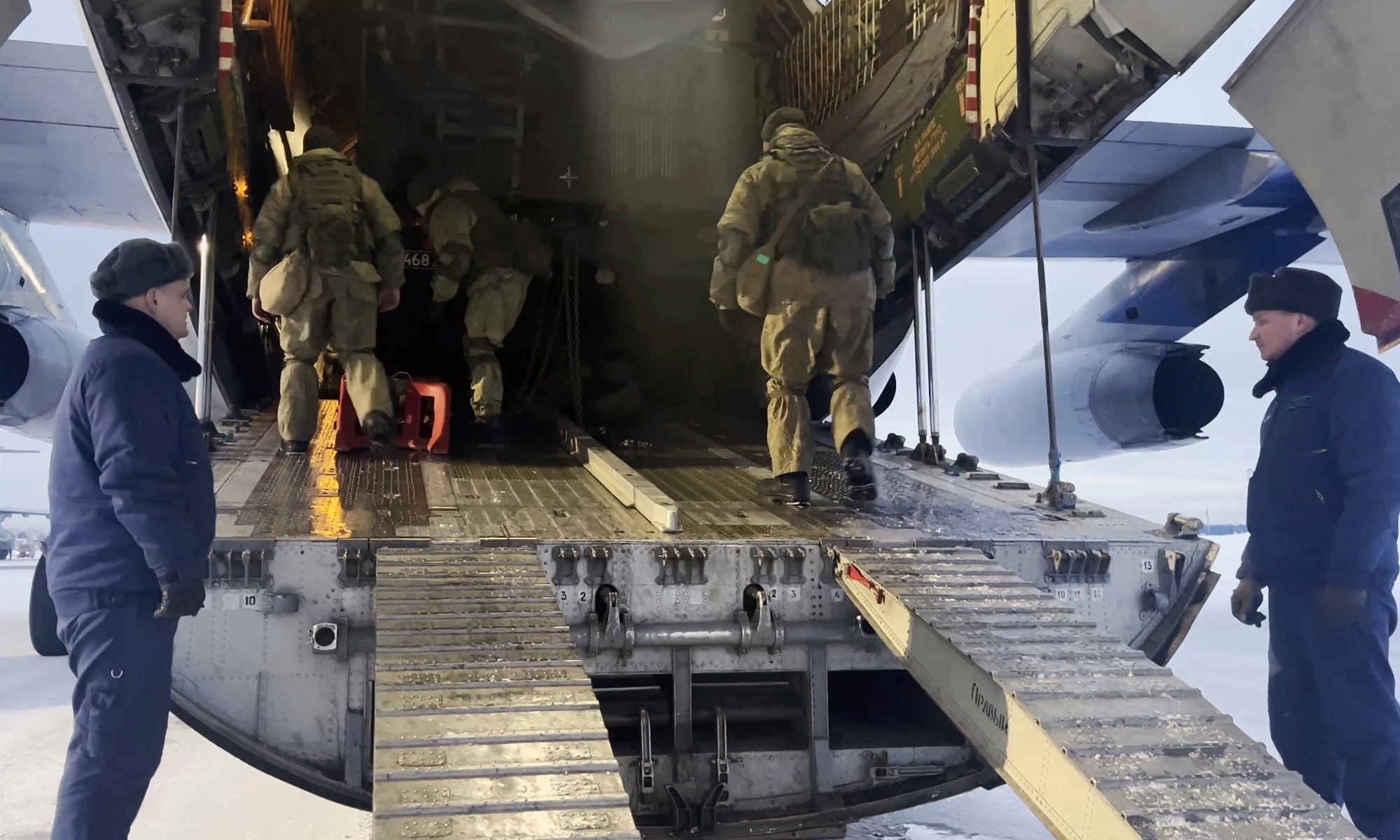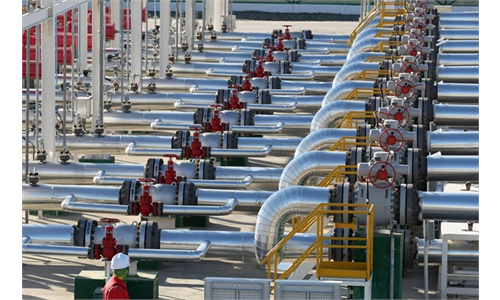CSTO to send peacekeeping troops to help quell unrest in Kazakhstan
Warning over riots being used by US to destabilize region, contain China, Russia

Russian airborne troop units depart aboard Russian Aerospace Forces aircraft to join the Collective Security Treaty Organization's (CSTO) peacekeeping force in Kazakhstan. Kazakhstan's President Tokayev has declared a two-week state of emergency over mass unrest in the country and asked the CSTO for assistance. Photo: The Paper
With half of Kazakhstan's territory engulfed in riots, the country has taken more measures to deal with the unrest, including seeking assistance from the Collective Security Treaty Organization (CSTO).
As the chaos in the Central Asian country is the worst in decades, analysts warned of the high possibility that the US will take the chance to destabilize the region to further contain China and Russia.
Kazakhstan has been dubbed the "energy hub" of Central Asia, and the current situation in Kazakhstan will have little impact on oil and gas pipelines and projects with China, and Chinese companies in the country have taken measures to ensure the safety of its employees, the Global Times has learned from related Chinese companies.
Following a request by Kazakh President Kassym-Jomart Tokayev and in view of the threat to the national security and sovereignty of Kazakhstan, including external intervention, the CSTO Collective Security Council had decided to deploy CSTO Collective Peacekeeping Forces to Kazakhstan, Council Chairman and Armenian Prime Minister Nikol Pashinyan wrote on his Facebook page on Thursday. He noted that forces will be deployed for a limited period in order to stabilize the situation.
The CSTO, which comprises Russia, Belarus, Armenia, Kazakhstan, Kyrgyzstan and Tajikistan, is a military alliance of post-Soviet states.
The CSTO's decision was made after riots erupted in many cities in Kazakhstan, which grew from protests initially sparked by anger at a hike in fuel prices in cities in the Mangistau region. Later, they engulfed Almaty and other cities and included more political requests, including opposition to First President of Kazakhstan Nursultan Nazarbayev, who has remained head of the country's Security Council after stepping down as president in 2019.
On Wednesday, Tokayev said in a statement carried on state television that he was seeking assistance from the CSTO to help overcome what he described as a "terrorist threat" and said that these groups were "thoroughly trained abroad."
Aside from seeking assistance from the CSTO, Kazakhstan has started to take firm measures in dealing with the riots. On Thursday, dozens of people were killed as they stormed administrative buildings and the police department in Almaty, according to TASS.
Analysts noted that the riots in Kazakhstan were initially due to domestic reasons, but the possibility of outside forces taking the chance to incite wider unrest cannot be ruled out.
The COVID-19 pandemic has dealt a heavy blow to Central Asian countries, and the economy in Kazakhstan also suffered from the breaking-off of trade and flights. In recent years, protests by the younger generation incited by nationalism have increased, shedding light on domestic problems and also explaining why the protests spread quickly to many cities, Su Chang, a research fellow at the Institute of Russian, Eastern European and Central Asian Studies at the Chinese Academy of Social Sciences, told the Global Times on Thursday.
Clashes between different political groups, especially during the power transition period, may also be the reasons behind the riots, and outside forces may also be involved in promoting the unrest.
"Who would benefit most from the riots? Probably the US and the West. Kazakhstan shares borders with both China and Russia, and the Biden administration's strategic purpose is to contain China and Russia. When Kazakhstan falls into chaos, the stability of the whole region would be affected," Su said.
From Tuesday and Wednesday, videos clips showing cars set on fire and police deploying tear gas as crowds swarmed the city center and tried to storm some government buildings were uploaded onto social media platforms.
On Wednesday, White House press secretary Jen Psaki insisted that the US has nothing to do with the unrest in Kazakhstan and called the allegation "crazy Russian claims."
With half of Kazakhstan's territory engulfed in riots, the country has taken more measures to deal with the unrest, including seeking assistance from the Collective Security Treaty Organization (CSTO).
As the chaos in the Central Asian country is the worst in decades, analysts warned of the high possibility that the US will take the chance to destabilize the region to further contain China and Russia.
The Russian Foreign Ministry said in a statement on Wednesday that Moscow is closely monitoring the developments in Kazakhstan.
Given its large territory and geopolitical position, Kazakhstan is an important country in Central Asia, and both Russia and the US are making efforts to draw it to their own side. Kazakhstan has tried to maintain a delicate balance between the two countries for its own interests, but this has become more difficult given the deterioration in US-Russia relations, Zhu Yongbiao, a professor from the Research Center for the Belt and Road of the Lanzhou University, told the Global Times on Thursday.
The US strategy in Central Asia has also changed. Previously, during its occupation of Afghanistan, the US had treated Central Asia as the logistics and transfer base for its military in Afghanistan, and the objective of carrying out democratic reforms in this region was not that important. But after the disgraceful US withdrawal from Afghanistan, what was previously a secondary mission became the main one, Zhu noted.
The expert pointed out that the US has never stopped its efforts in making "democratic reforms" in Central Asia, for example, by assisting local elites to study in the US, training and funding NGOs and cultivating media.
Echoing Zhu's remarks, by checking public data released on its official website, the Global Times found that in 2020, the National Endowment for Democracy (NED), a veteran anti-China foundation financed by the US government, had poured $1.08 million into Kazakhstan to fund projects on independent news and commentary and human rights advocacy. For example, $50,000 of this money had been used to promote "freedom of peaceful assembly in Kazakhstan."
Zhu also warned that as the Biden administration has attached more importance to "diplomacy on values and democracy" and using China's Xinjiang region to disturb China, the US will ramp up its efforts to make waves in the region to sow discord between China and Central Asian countries.
Given the short distance between Almaty and China's Xinjiang region, China will increase its border controls, analysts said, noting that the current situation in Kazakhstan is still controllable.
Cooperation on energy remains safe
Kazakhstan shares border with China's Xinjiang region. As friendly neighbors and comprehensive strategic partners, China and Kazakhstan have maintained close relations with bilateral trade flourishing in recent years.
The current protests in Kazakhstan have also sparked concerns over oil and gas transportation to China. However, Chinese enterprises and industry insiders reached by the Global Times said that the unrest will not have a big impact as the transportation of oil and gas is technically reliable. Local Chinese companies said that they are prepared, and the Kazakhstan government will also take corresponding measures to ensure safety.
A Chinese energy company also said on Thursday that its oil exploration projects are located far away from big cities, and thus have not been affected for the time being, while local businesses are all operating normally.
"We're not thinking about pulling out of Kazakhstan, because it's a very big part of our market. The vast majority of our employees are local," the company told the Global Times on the condition of anonymity.
The situation in Kazakhstan will inevitably have some impact on the transportation of oil and gas, but overall operations will continue to be normal, Yang Jin, an associate research fellow at the Institute of Russian, Eastern European and Central Asian Studies at the Chinese Academy of Social Sciences, told the Global Times on Thursday.
"The China-Central Asia Gas Pipeline concerns the core national interests of Kazakhstan and is one of its economic lifelines. Therefore, even if there is temporary domestic unrest, it will not affect transportation safety," said Yang.

